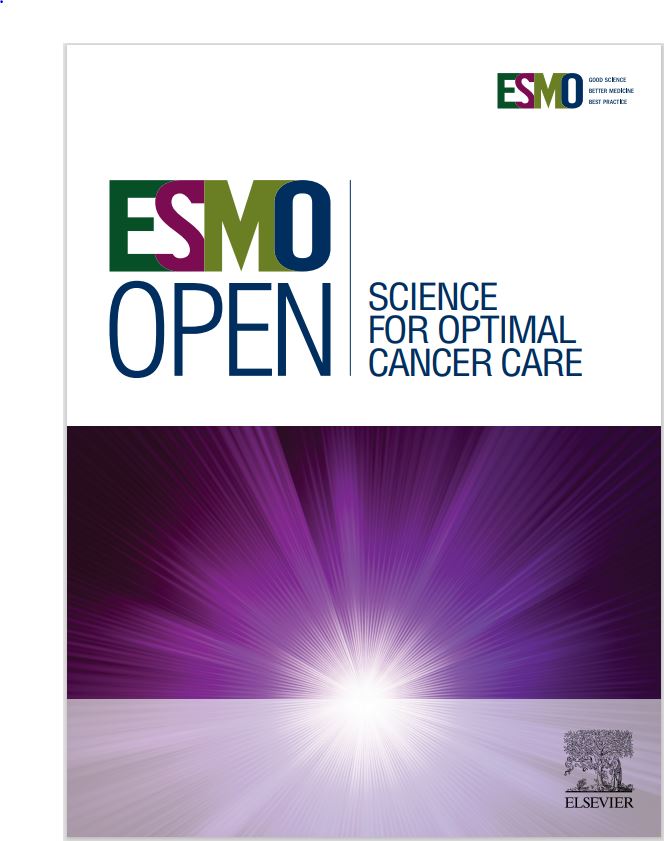Pan-cancer clinical and molecular landscape of MTAP deletion in nationwide and international comprehensive genomic data
IF 7.1
2区 医学
Q1 ONCOLOGY
引用次数: 0
Abstract
Background
Early-phase clinical trials of protein arginine methyltransferase 5 (PRMT5) inhibitors as synthetic lethal strategies have shown promising efficacy in methylthioadenosine phosphorylase (MTAP)-deleted tumors. To refine and expand this promising therapeutic approach within the framework of precision oncology, it is critical to comprehensively characterize the clinical and molecular profiles of MTAP-deleted tumors.
Materials and methods
This pan-cancer retrospective cohort study analyzed clinico-genomic data from the Center for Cancer Genomics and Advanced Therapeutics (C-CAT) database, which includes 99.7% of patients who underwent comprehensive genomic profiling (CGP) in Japan between June 2019 and November 2023. Machine learning and explainable artificial intelligence methods were applied to identify clinical predictors of MTAP deficiency. Findings were validated and compared using The Cancer Genome Atlas (TCGA) and American Association for Cancer Research (AACR) Genomics Evidence Neoplasia Information Exchange (GENIE) datasets.
Results
Among 51 828 pan-cancer patients in the C-CAT cohort, MTAP deletion was observed in 4964 cases (9.6%), with a high prevalence in pancreatic (18.4%), biliary tract (15.6%), and lung (14.3%) cancers. MTAP deletion was associated with distinct clinical features, including male sex (56.0% versus 47.8%), older age (mean 62.4 versus 59.8 years), and shorter interval from diagnosis to CGP (median 380.0 versus 567.0 days). In pancreatic cancer, MTAP deletion was more common in KRAS-mutant tumors (19.8%) compared with KRAS wild-type tumors (8.9%). Across cancer types, MTAP deletion was less frequent in RB1-mutant tumors (pan-cancer: 3.2%, pancreatic: 7.6%, lung: 2.5%, biliary tract: 5.4%) than in RB1 wild-type tumors (9.9%, 18.7%, 16.1%, 16.0%). These findings were validated using the TCGA (n = 9896) and GENIE (n = 178 034) datasets. In lung adenocarcinoma, MTAP deletion was found in 22.8% of EGFR-mutated tumors, 25.0% of ALK-translocated tumors, and 20.8% of ROS1-translocated tumors.
Conclusions
MTAP deletion is associated with unique clinical and molecular features. These findings define the characteristics of MTAP-deleted cancers and provide a basis for synthetic lethal strategies in precision oncology.
泛癌临床和分子景观的MTAP缺失在全国和国际综合基因组数据
蛋白精氨酸甲基转移酶5 (PRMT5)抑制剂作为合成致死策略的早期临床试验显示,在甲基硫代腺苷磷酸化酶(MTAP)缺失的肿瘤中有良好的疗效。为了在精确肿瘤学的框架内完善和扩展这一有前途的治疗方法,全面表征mtap缺失肿瘤的临床和分子特征至关重要。材料和方法这项泛癌症回顾性队列研究分析了来自癌症基因组学和高级治疗中心(C-CAT)数据库的临床基因组数据,其中包括2019年6月至2023年11月期间在日本接受全面基因组分析(CGP)的99.7%的患者。应用机器学习和可解释的人工智能方法来识别MTAP缺乏的临床预测因素。研究结果使用癌症基因组图谱(TCGA)和美国癌症研究协会(AACR)基因组证据肿瘤信息交换(GENIE)数据集进行验证和比较。结果在C-CAT队列中的51 828例泛癌患者中,4964例(9.6%)存在MTAP缺失,其中胰腺癌(18.4%)、胆道癌(15.6%)和肺癌(14.3%)的发生率较高。MTAP缺失与不同的临床特征相关,包括男性(56.0%对47.8%),年龄较大(平均62.4岁对59.8岁),从诊断到CGP的间隔较短(中位380.0天对567.0天)。在胰腺癌中,MTAP缺失在KRAS突变型肿瘤(19.8%)中比KRAS野生型肿瘤(8.9%)更常见。在不同的癌症类型中,MTAP缺失在RB1突变型肿瘤(泛癌:3.2%,胰腺癌:7.6%,肺癌:2.5%,胆道:5.4%)中的发生率低于RB1野生型肿瘤(9.9%,18.7%,16.1%,16.0%)。使用TCGA (n = 9896)和GENIE (n = 178 034)数据集验证了这些发现。在肺腺癌中,22.8%的egfr突变肿瘤、25.0%的alk易位肿瘤和20.8%的ros1易位肿瘤中存在MTAP缺失。结论smtap缺失具有独特的临床和分子特征。这些发现定义了mtap缺失癌症的特征,并为精确肿瘤学的合成致死策略提供了基础。
本文章由计算机程序翻译,如有差异,请以英文原文为准。
求助全文
约1分钟内获得全文
求助全文
来源期刊

ESMO Open
Medicine-Oncology
CiteScore
11.70
自引率
2.70%
发文量
255
审稿时长
10 weeks
期刊介绍:
ESMO Open is the online-only, open access journal of the European Society for Medical Oncology (ESMO). It is a peer-reviewed publication dedicated to sharing high-quality medical research and educational materials from various fields of oncology. The journal specifically focuses on showcasing innovative clinical and translational cancer research.
ESMO Open aims to publish a wide range of research articles covering all aspects of oncology, including experimental studies, translational research, diagnostic advancements, and therapeutic approaches. The content of the journal includes original research articles, insightful reviews, thought-provoking editorials, and correspondence. Moreover, the journal warmly welcomes the submission of phase I trials and meta-analyses. It also showcases reviews from significant ESMO conferences and meetings, as well as publishes important position statements on behalf of ESMO.
Overall, ESMO Open offers a platform for scientists, clinicians, and researchers in the field of oncology to share their valuable insights and contribute to advancing the understanding and treatment of cancer. The journal serves as a source of up-to-date information and fosters collaboration within the oncology community.
 求助内容:
求助内容: 应助结果提醒方式:
应助结果提醒方式:


